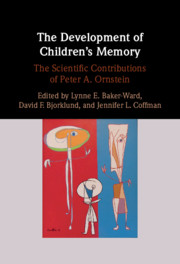Book contents
- The Development of Children’s Memory
- The Development of Children’s Memory
- Copyright page
- Dedication
- Contents
- Figures
- Tables
- Contributors
- Part I Backdrop
- Part II Children’s Memory Strategies
- Chapter 4 Overview
- Chapter 5 Strategies and Self-Derivation
- Chapter 6 Commentary
- Part III Children’s Event Memory
- Part IV Family Socialization of Memory
- Part V Classroom Socialization of Memory
- Part VI Perspective
- References
- Index
Chapter 5 - Strategies and Self-Derivation
Means of Maintaining and Extending Knowledge
from Part II - Children’s Memory Strategies
Published online by Cambridge University Press: 28 May 2021
- The Development of Children’s Memory
- The Development of Children’s Memory
- Copyright page
- Dedication
- Contents
- Figures
- Tables
- Contributors
- Part I Backdrop
- Part II Children’s Memory Strategies
- Chapter 4 Overview
- Chapter 5 Strategies and Self-Derivation
- Chapter 6 Commentary
- Part III Children’s Event Memory
- Part IV Family Socialization of Memory
- Part V Classroom Socialization of Memory
- Part VI Perspective
- References
- Index
Summary
In this chapter, we review Ornstein’s contributions to the study of children’s memory strategy use to maintain information they are expected to remember, including barriers, supports, and application. We then discuss our own work on how children go beyond maintaining information to extending their knowledge base by going beyond what was explicitly provided and self-deriving new knowledge through integration of separate learning episodes. We examine the parallels in how knowledge is maintained and extended, including the role of prior knowledge. We conclude with three lessons learned from the work of Ornstein and colleagues that will enrich developmental science: move the research into ecologically relevant and even “high-stakes” contexts, conduct longitudinal work, and investigate the role of metacognition.
- Type
- Chapter
- Information
- The Development of Children's MemoryThe Scientific Contributions of Peter A. Ornstein, pp. 62 - 78Publisher: Cambridge University PressPrint publication year: 2021
- 2
- Cited by

